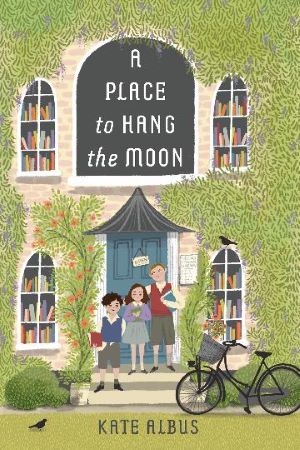Siblings William (12), Edmund (11) and Anna (9) have just lost their grandmother. She has been their guardian since their parents died when William was 5, but was never a doting, loving, kind sort of grandmother. Formidable is one of the descriptions given at her funeral, and the children agreed.
never a doting, loving, kind sort of grandmother. Formidable is one of the descriptions given at her funeral, and the children agreed.
But now there is the problem of who will look after them. Their kind housekeeper is too elderly and is going to retire, so what is to be done? The family solicitor has an idea. What he suggests is that the siblings join the evacuees out of London to the country. They will be billeted (hopefully together), and maybe, just maybe, they can find their forever family. Preposterous is the description given to this idea. But with no other options, they join hundreds of school children on a train to the country.
They are relieved to be billeted together with a town butcher and his family. It would be bearable if it wasn’t for the twin boys hellbent on making William and Edmund’s lives miserable.
The next billet is even worse, with not enough food or kindness to go around.
The only brightness in the sibling’s lives is the local library and a kind librarian. But despite living in the town for sometime, she too is shunned and unaccepted. A friendship builds between them which helps them deal with the stigmas laid upon them by the locals.
The three only trust in each other however, sticking together like glue, especially when one of them is being picked on. This helps get them through the months of uncertainty and strife. When things are as bad as they can get, the school nativity play brings the entire town together as they celebrate Christmas. It also brings a tiny spark of hope for their future.
I loved this book! I have read many London evacuee books and many have touched my heart. A Place to Hang the Moon did that and more. It would make the perfect class Read Aloud for three reasons.
- It’s a wonderful story, portraying what it was like to be an evacuee, sent far from home to live with strangers, rationing, and the worry that your home may not even be there when you returned after the merciless bombing London received.
- The references to the many children’s classics throughout the story, through the local librarian and the book loving children themselves.
- The language. Being only 9, Anna is confused by many of the complicated words used by the adults and strangers in their lives. These words are often explained without detracting from the story, by her elder brothers, teachers or their only real friend in the town – the librarian. This could be used in the classroom for vocabulary extension all whilst enjoying a great read aloud.
I particularly enjoyed the character growth of Edmund. He is the middle child and is forever trying to prove himself. He flatly forbids himself to cry – ever. He hates being told what to do, by anyone – especially his older brother. He is obstinate and the cause of much of their trouble, but also is the most interesting as he begins to grow after the fallout of his actions and especially under positive attention that he has never had.
I enjoyed the characters so much I was sad to leave them behind in the book – keen to see how their new lives progress into a much more hopeful future.
Author – Kate Albus
Age – 8+
(2023, Penguin Random House, War, WWII, World War 2, Evacuees, London, Siblings, Fitting in, Finding a family, Books, Reading, Children’s Classics, Language, Bullies, Bullying, School, Billets, Library, Librarian, Suspicion, Prejudice, Exclusion, Hope, Trust, Poverty, Secret)
